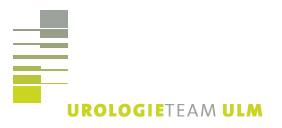Einzigartig und komplex…
Es gibt nichts, was einzigartiger und zugleich komplexer ist, als der Mensch und seine Gesundheit. Und es gibt kaum etwas, das so lern- und merkfähig, so erfahren und so innovativ ist, wie der menschliche Organismus. Deshalb muss auch Diagnostik, Therapie und Prävention so komplex, so ganzheitlich und so an Erfahrung und Innovation ausgerichtet sein, wie es der Mensch und sein Organismus sind.
Das ist unser Leitbild –
als Mediziner und Menschen.
State of the art: Lehre, Forschung, Praxis
Lehre
Vorlesungen Prof. Dr. med. Thomas Paiss
Kinderurologie Propädeutiksemester Humanmedizin
Hauptvorlesung Urologie
Wintersemester 2011/2012
Famulatur
Kaum ein anderes Fach ist so interdisziplinär wie Urologie. Kenntnisse in der Urologie sind wichtig für Chirurgie, Innere Medizin, Nephrologie, Onkologie, Endokrinologie, Kinderheilkunde, Gynäkologie, Strahlentherapie, Radiologie, Nuklearmedizin und Neurologie. Wir zeigen Ihnen die Patientenversorgung in der urologischen Praxis und geben Ihnen Einblicke in urologische Diagnostik (Sonographie, Endoskopie, Urodynamik, Labormedizin) und Therapie (Pharmakotherapie, Medikamentöse Tumortherapie, Ambulante Operationen). Bei Interesse wenden sie sich bitte an
info@urologieteam-ulm.de
Ausbildung Medizinischtechnische Laboratoriumsassistenz (MTLA)
Unsere Praxis ist Ausbildungslabor der Akademie für Gesundheitsberufe Universitätsklinik Ulm in den Bereichen Klinische Chemie, Mikrobiologie und Spermatologie.
Forschung
Veröffentlichungen Prof. Paiss (Autor bzw. Co-Autor)
1. International Consortium for Prostate Cancer Genetics. Genome-wide linkage analysis of 1,233 prostate cancer pedigrees from the International Consortium for Prostate Cancer Genetics using novel sumLINK and sumLOD analyses.
2. Identification of seven new prostate cancer susceptibility loci through a genome-wide association study.
3. Genome-wide linkage analysis of TMPRSS2-ERG fusion in familial prostate cancer.
4. The correlation between male age, sperm quality and sperm DNA fragmentation in 320 men attending a fertility center.
5. Expression changes of CAV1 and EZH2, located on 7q31 approximately q36, are rarely related to genomic alterations in primary prostate carcinoma.
6. International Consortium for Prostate Cancer Genetics. Compelling evidence for a prostate cancer gene at 22q12.3 by the International Consor
7. Association of a positive family history with histopathology and clinical course in early-onset prostate cancer.
8. Pooled genome linkage scan of aggressive prostate cancer: results from the International Consortium forProstate Cancer Genetics.
9. Prospective evaluation of prostate cancer screening in men with a family history of the disease.
10. Role of the Nijmegen breakage syndrome 1 gene in familial and sporadic prostate cancer.
11. A rare cause of recurrent macrohematuria: case report.
12. Germline mutations of the MSR1 gene in prostate cancer families from Germany.
13. Radiosensitivity detected by the micronucleus test is not generally increased in sporadic prostate cancer patients.
14. Mutation screen and association study of EZH2 as a susceptibility gene for aggressive prostate cancer.
15. Mutation screen and association study of EZH2 as a susceptibility gene for aggressive prostate cancer.
16. Association of a CAV-1 haplotype to familial aggressive prostate cancer.
17. Role of a CYP17 promoter polymorphism for familial prostate cancer risk in Germany.
18. Is the prostate cancer screening behaviour of men with familial predisposition predictable?
19. Mutation screening and association study of RNASEL as a prostate cancer susceptibility gene.
20. A genomewide linkage analysis for prostate cancer susceptibility genes in families from Germany.
21. Familial versus sporadic prostate cancer in the German population. Clinical and pathological characteristics in patients after radical prostatectomy.
22. Association between the clinical presentation and epidemiological features of familial prostate cancer in patients selected for radical prostatectomy.
23. Linkage of aggressive prostate cancer to chromosome 7q31-33 in German prostate cancer families.
24. Preventing prostate carcinoma in men with familial disposition.
25. A candidate gene approach within the susceptibility region PCaP on 1q42.2-43 excludes deleterious mutations of the PCTA-1 gene to be responsible for hereditary prostate cancer.
26. Confirmation of the prostate cancer susceptibility locus HPCX in a set of 104 German prostate cancer families.
27. Familial prostate carcinoma in Germany.
28. Some tumors of the bladder are polyclonal in origin.
29. Prostate cancer and the problem of genotype phenotype correlation.
30. Hereditary prostate cancer in germany.
31. Vitamin D receptor polymorphisms as markers in prostate cancer.
32. Genetic analysis of familial prostatic cancer: localization of a gene predisposing to prostatic cancer (PCaP) on chromosome 1q42.2-43.
33. (CAG)nCAA and GGN repeats in the human androgen receptor gene are not associated with prostate cancer in a French-German population.
34. Detailed marker chromosome analysis in cell line U-BLC1, established from transitional-cell carcinoma of the bladder.
35. The ileal neobladder: complications and functional results in 363 patients after 11 years of followup.
36. Chromosomal changes during progression of transitional cell carcinoma of the bladder and delineation of the amplified interval on chromosome arm 8q.
37. Predisposing gene for early-onset prostate cancer, localized on chromosome 1q42.2-43.
38. Does the option of the ileal neobladder stimulate patient and physician decision toward earlier cystectomy?
39. Diagnosis of intravesical ureterocele with MRI.
40. Ileal neobladder with anastomosis to the female urethra.
41. High-dose pelvic irradiation followed by ileal neobladder urinary diversion: complications and long-term results.
42. The ileal neobladder–updated experience with 306 patients.
43. The ileal neobladder in women: 9 years of experience with 18 patients
44. Extracorporeal shockwave lithotripsy in children. Complications and long-term results.
Vorträge
State of the art
1. Sinnvolle Früherkennung und Prävention in der Urologie:
Vortragsreihe Prävention der Hirschapotheke
2. Alternativen zu Dapoxetin in der Behandlung der Ejakulatio präcox:
Vortrag im Rahmen der Jahrestagung der Deutschen Gesellschaft für Urologie
3. Neurogene Blasenentleerungsstörung: Diagnostik, Urologische Therapieoptionen:
Vortrag bei NeuroPoint – Gesellschaft für vorbeugende Gesundheitspflege Dias können als pdf-Dokument zur Verfügung gestellt werden.
